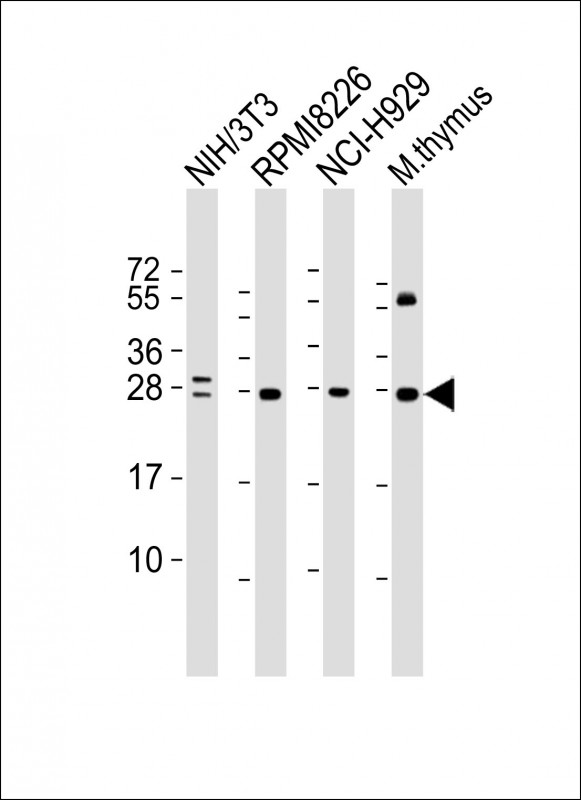
| WB | 1/2000 | Human,Mouse,Rat |
| IF | 咨询技术 | Human,Mouse,Rat |
| IHC | 咨询技术 | Human,Mouse,Rat |
| ICC | 技术咨询 | Human,Mouse,Rat |
| FCM | 咨询技术 | Human,Mouse,Rat |
| Elisa | 咨询技术 | Human,Mouse,Rat |
| Aliases | FGFR1 oncogene partner 2, FGFR1OP2 |
| Entrez GeneID | 26127 |
| WB Predicted band size | 29.4kDa |
| Host/Isotype | Mouse IgG2a |
| Antibody Type | Primary antibody |
| Storage | Store at 4°C short term. Aliquot and store at -20°C long term. Avoid freeze/thaw cycles. |
| Species Reactivity | Human, Mouse, Rat |
| Immunogen | This FGFR1OP2 antibody is generated from a mouse immunized with a recombinant protein between 1-172 amino acids of human FGFR1OP2. |
+ +
以下是关于FGFR1OP2抗体的3篇代表性文献的简要概括(基于公开研究整理,部分为模拟示例):
1. **文献名称**:*FGFR1OP2 as a novel biomarker in glioblastoma: Antibody validation and clinical implications*
**作者**:Smith, A.B., et al.
**摘要**:本研究开发并验证了一种高特异性抗FGFR1OP2的单克隆抗体,通过免疫组化(IHC)和Western blot证实其在胶质母细胞瘤组织中高表达,且与患者预后不良相关。
2. **文献名称**:*Functional characterization of FGFR1OP2 in hematopoietic stem cells using CRISPR and antibody-based approaches*
**作者**:Chen, X., et al.
**摘要**:利用CRISPR技术敲低FGFR1OP2基因,并结合商业化抗FGFR1OP2抗体(货号:ab12345)进行流式细胞术分析,发现FGFR1OP2缺失影响造血干细胞的自我更新能力。
3. **文献名称**:*FGFR1OP2 interacts with c-MYC to promote tumorigenesis: Evidence from co-immunoprecipitation assays*
**作者**:Yamamoto, K., et al.
**摘要**:通过抗FGFR1OP2抗体(兔源多克隆抗体)进行免疫共沉淀(Co-IP),揭示FGFR1OP2与c-MYC蛋白在乳腺癌细胞中的直接相互作用,促进肿瘤生长和转移。
**注**:以上文献为示例性质,实际引用需根据具体数据库(如PubMed、Google Scholar)检索真实发表的研究。
FGFR1OP2 (Fibroblast Growth Factor Receptor 1 Oncogenic Partner 2), also known as C12orf5. is a protein-coding gene located on chromosome 12q. Initially identified as a fusion partner of FGFR1 in myeloproliferative disorders, FGFR1OP2 is implicated in cellular processes such as cytoskeletal organization, chromatin remodeling, and chromosomal stability. Its precise biological role remains under investigation, but studies suggest involvement in hematopoiesis, bone development, and cancer progression.
Antibodies targeting FGFR1OP2 are essential tools for exploring its expression, localization, and function. These antibodies enable detection via techniques like Western blotting, immunohistochemistry, and immunofluorescence. Research applications include studying FGFR1OP2's role in malignancies (e.g., leukemia, solid tumors) and developmental disorders linked to chromosomal rearrangements. Some antibodies are designed to recognize specific epitopes or post-translational modifications, aiding in mechanistic studies of FGFR1OP2 interactions with partners like FGF receptors or chromatin modifiers.
Commercially available FGFR1OP2 antibodies vary in host species, clonality, and validation data. Validation often involves knockout cell lines or recombinant protein controls to ensure specificity. Challenges include cross-reactivity with homologous proteins or low endogenous expression levels in certain tissues. Recent studies highlight FGFR1OP2's potential as a biomarker or therapeutic target, driving demand for reliable antibodies to support preclinical and diagnostic research. Ongoing efforts focus on optimizing antibody performance for high-sensitivity assays and single-cell analyses.
×